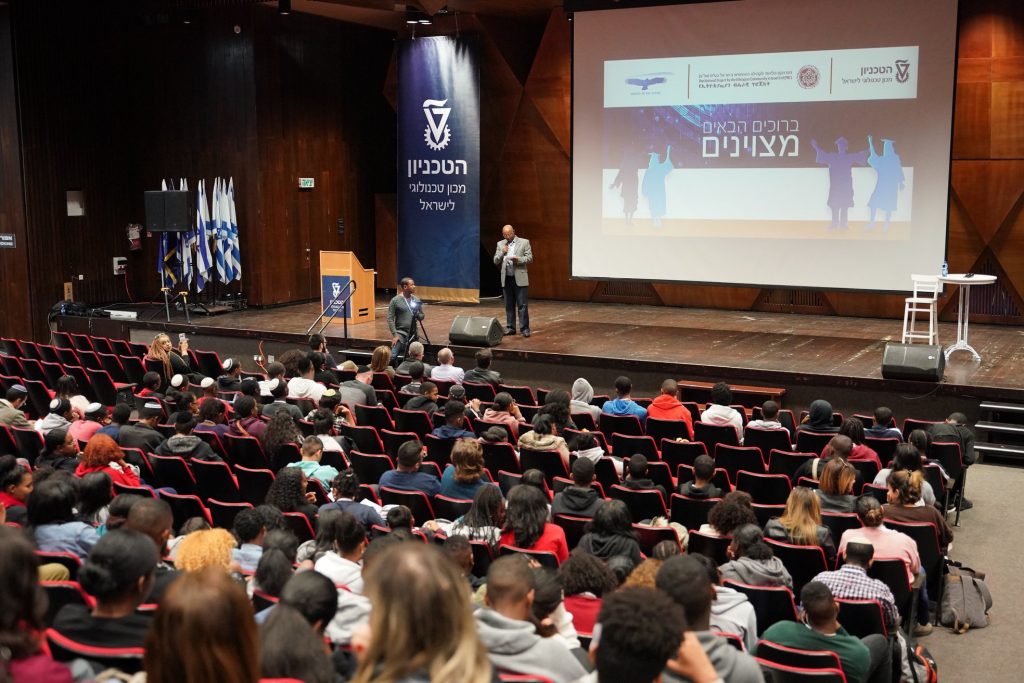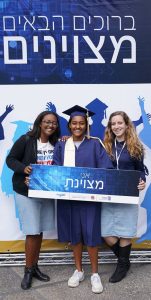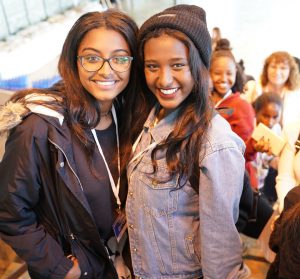‘The Technion is the best ticket to realize your dreams’
‘The Technion is the best ticket to realize your dreams’
Some 200 outstanding students from the Ethiopian community visited the Technion as part of the “Excellence” event
Some 200 high school students from the Ethiopian community visited the Technion last week as part of the “Excellence” event. The happening was designed to expose students to the possibilities of being accepted to and studying at the Technion, and the new horizons this can open for them. The event was held in cooperation with the Leaders of the Future Association and the Ethiopian National Project in Israel (ENP).

Jonathan David, founder of Leaders of the Future, which works to realize the full potential of youth from the Ethiopian community in Israel, said: “I am here because I want to invest in you and promote students from the Ethiopian community, and I expect you to come to the Technion and invest in your studies.”
Roni Akale, director-general of ENP, presented the achievements of the Ethiopian community in Israel, which in “30 years has minimized a 2,500-year gap.” He told the students that, “for some of you, this day will be remembered as the day that changed your life, because it is the day that connected dreams and their realization. It doesn’t matter if you want to be entrepreneurs or cancer researchers or anything else – the statistics prove that the Technion is the best ticket to realize your dreams. We cannot progress through complaints. We must believe in ourselves, work hard and remember that the only barrier to success is within us. I hope that in the future you will represent not only the Ethiopian community but rather the entire State of Israel.”
 Prof. Noam Soker, head of the Technion Mechina, or preparatory academy, told the students that, “the Technion deals with the training of scientists and engineers, but no less important, in promoting research that expands human knowledge and benefits people. Most of the research is conducted by graduate students, but in the undergraduate degree students also have the opportunity to engage in research.”
Prof. Noam Soker, head of the Technion Mechina, or preparatory academy, told the students that, “the Technion deals with the training of scientists and engineers, but no less important, in promoting research that expands human knowledge and benefits people. Most of the research is conducted by graduate students, but in the undergraduate degree students also have the opportunity to engage in research.”
He added that youth who do not have a matriculation certificate, or whose certificate is insufficient, can still pass a preparatory program at the Technion that prepares them for studies at the institution. “The Technion has always promoted the integration of all sectors of Israeli society, especially in the context of higher education in science and technology. We are happy to have the opportunity to host Ethiopian youth in the hope that many of you will come to the Technion.”
Sarah Nagosa, who is completing her Ph.D. at the Ruth & Bruce Rappaport Faculty of Medicine, talked about her path to the Technion and her years on campus. Nagosa immigrated from Ethiopia to Israel at the age of three and grew up in Kiryat Malachi. She heard about the Technion for the first time at the age of 17, when American donors Joel and Joan Kushan visited a program she was involved with – the Youth Council Kiryat Malachi. After completing her bachelor’s degree in biology at the Technion, she worked for two years with Pluristem, which develops stem-cell based treatments. From there, she returned to the Technion for a master’s degree, which turned into a fast track for a doctorate under the direction of Prof. Ruby Shalom Feuerstein.
She told the students about the difficulties, failing her organic chemistry test, and the encouragement she received from her family and from the Technion itself. “The Technion is tough academically but gentle in every other way. They never let me compromise academically, but they always helped me in every other aspect, and here I learned that if you work hard, you succeed,” she said.
At the end of the event, a panel of students was held with the participation of Keren Yitzhak, Itamar Ordani, Shai Avig, Aviel Itzhak and Yamserts Dasta.
Keren Yitzhak, 25, is about to graduate from the Computer Science Department and in parallel to her studies works at Mellanox. She said that at the time of her discharge from the IDF, she attended a conference at the Technion. “Five years ago, I came just like you, to the Churchill Hall at the Technion and I heard a lecture about the preparatory academy at the Technion. They told us that there were scholarships for living expenses, studies, and for the dormitories, but I did not believe it and asked if they would really help me with all this. When I was released, I immediately began to study in the preparatory program, and for me, it is very exciting to sit here, this time on stage, and tell you how worth it is to study at the Technion.”
Aviel Yitzhak, 22 from Ashdod, received an offer to enroll in the preparatory program at the Technion within the framework of the Atidim program. He said arrived with mediocre grades [from high school] but graduated from the preparatory program with honors and was accepted to the Faculty of Mechanical Engineering where he currently studies. “The road was hard, and on my first exam, I received such a low score that I was sure this was not the place for me. But I was encouraged and received help, and eventually, I saw that when you invest, you succeed.”
 Shay Agiv, 22, grew up in Yavne; he also arrived at the Technion unprepared but completed the preparatory program with honors. “First, I thought that only the sons and daughters of engineers, doctors, and scientists came to the Technion, but when I arrived, I saw other Ethiopians here. It’s true that we come from difficult homes, with parents who do not even know Hebrew, but with time you learn to study hard and this process at the Technion also makes you a more serious and better person.”
Shay Agiv, 22, grew up in Yavne; he also arrived at the Technion unprepared but completed the preparatory program with honors. “First, I thought that only the sons and daughters of engineers, doctors, and scientists came to the Technion, but when I arrived, I saw other Ethiopians here. It’s true that we come from difficult homes, with parents who do not even know Hebrew, but with time you learn to study hard and this process at the Technion also makes you a more serious and better person.”
Itamar Ordani, who studies in the Computer Science faculty, said that in the neighborhood where he grew up there are not a lot of students. “When I return to my neighborhood, everyone says, ‘the student has come home.’ They are proud of me and are also proud that I am trying to show other youth that they can also come study here.”
Yamserts Dasta, who is completing her degree in information systems in the Faculty of Computer Science and the Faculty of Industrial Engineering and Management, successfully passed the Technion preparatory program and from there continued to pursue her undergraduate degree. “In my family and in my environment, there are no engineers, so that I had to learn many things on my own. Now I am nearing the end of my studies and I hope to find work in this field – something that will be interesting and satisfying.”


